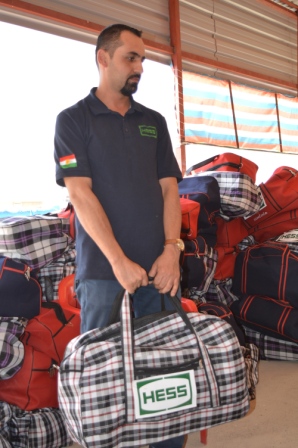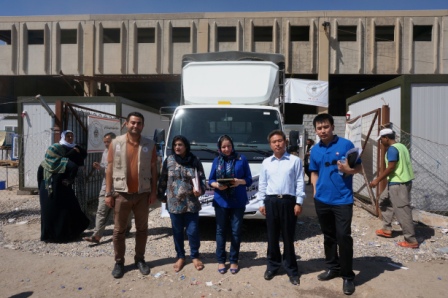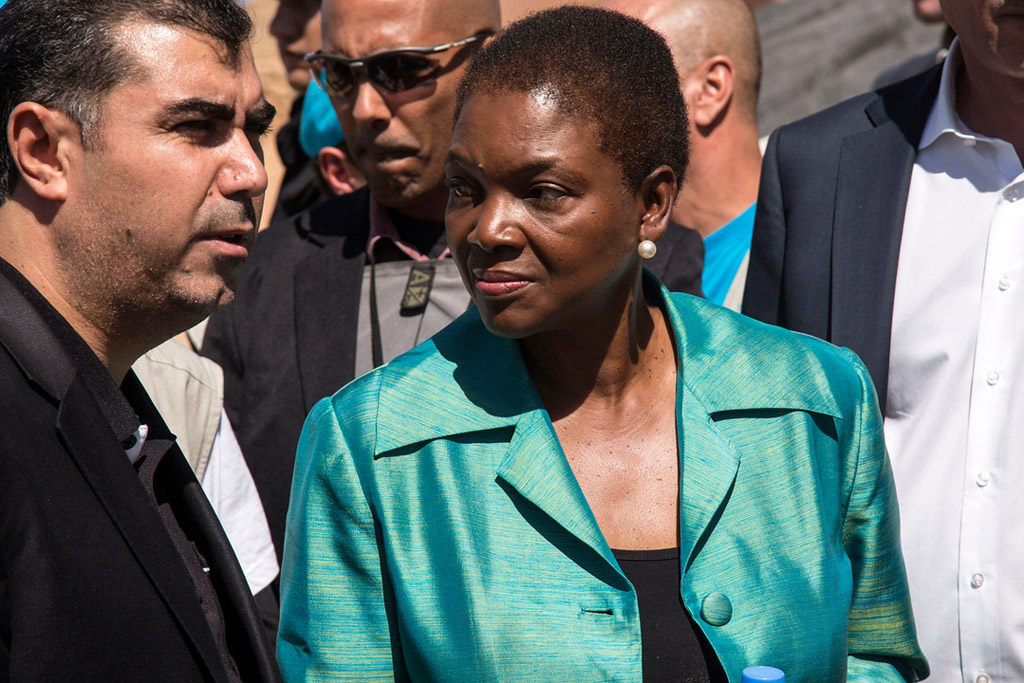
In late August 2014, the Ministry of Natural Resources broadened the Kurdistan Oil and Gas Humanitarian Initiative (KOGHI), to include assistance for tens of thousands of IDPs and refugees fleeing attacks by the Islamic State (IS). The MNR has called on oil companies operating in the Kurdistan Region to help because although the KRG is doing as much as it can with its limited resources to help the displaced, it cannot tackle this massive task alone. Read here about the assistance and funding that the oil companies are providing at this critical time.
Disclaimer: The KRG Ministry of Natural Resources is not responsible for information provided by the agencies, NGOs and the oil industry for the content of this page.
CEO Tony Hayward: Genel Energy will match donations to International Rescue Committee’s emergency aid work in Kurdistan
On 13 November, Tony Hayward, CEO of Genel Energy, issued the following message:
“The Kurdistan Region of Iraq is sheltering over 1.6 million of these vulnerable people - but desperately needs support to meet their most basic immediate needs, to help them survive as winter approaches.
Genel Energy has undertaken a number of projects to support these refugees, and is now offering to match any donation that you make to the International Rescue Committee’s emergency aid work in Kurdistan.
Many people fled for their lives on foot and brought only what they could carry, and, as I have seen for myself, their needs are extremely basic – shelter, warm clothing, food and water, somewhere to wash and sleep, and protection for children who have been separated from their families. Large numbers of people have suffered terrible trauma and are in need of medical attention.
The International Rescue Committee is an extremely effective and practical organisation, working on the ground in the Kurdistan Region of Iraq to provide life-saving support to refugees in the following ways:
- The distribution of sleeping kits, hygiene kits and women-and-baby kits
- Water, Sanitation and Hygiene (WASH) support such as water trucking, water testing, Aquatabs, and vital oral rehydration solution
- The provision of stocks of pharmaceuticals to treat chronic illnesses such as hypertension and diabetes
- The provision of essential information on IDP rights, services available, and ways to access these services
- Protecting separated and unaccompanied children and referring them to appropriate services.”
Please click here to donate to the IRC, and Genel Energy will match your donation until 10th December 2014.
Chevron donates $500,000 to Save the Children fund and $150,000 to International Rescue Committee
As part of its initiative to support KOGHI, in September 2014 Chevron donated $500,000 US dollars to the Save the Children fund international NGO, in response to the huge influx of IDPs who have taken refuge in the Kurdistan Region. The focus of Chevron’s contribution to Save the Children is on basic human needs such as food, water and child protection.
Chevron also contributed $150,000 to the International Rescue Committee (IRC) to help provide equipment and educational materials for two schools in the Kurdistan Region.
Hess donates $250,000 dollars to Internal Rescue Committee and Internal Medical Corps
To support the IDP humanitarian relief effort, Hess Corporation donated $250,000 US dollars to the International Rescue Committee (IRC) and to the International Medical Corps (IMC), for the benefit of IDPs and refugees in Kurdistan.
When KOGHI was first launched to help the Syrian refugees, Hess donated to the IRC, and after seeing that the previous donation was used effectively and wisely, the company decided that the IRC should once again be funded to support its work in the Kurdistan Region. In keeping with Hess’s values and emphasis on supporting healthcare initiatives, Hess also made a donation to the IMC. IMC is well established and has been working with both Syrian refugees and internally displaced populations in Kurdistan.
Locally, Hess employees took the initiative to provide support to 300 displaced Yezidi families located in Esyan village near Shaikhan in Dohuk governorate. Dohuk has received and hosted the highest number of IDPs following the ISIS attacks. ‘Dignity bags’ were distributed to families displaced by terrorist attacks by ISIS. Hess employees purchased a variety of supplies, put together the bags and delivered them directly to the refugees in Esyan village. The dignity bags contained food and supplies for children and their mothers and were much appreciated by the families.
Marathon Oil donates total of $100,000 to IRC, Save the Children and ACTED
Following the MNR’s broadening of KOGHI in the wake of the ISIS attacks, Marathon Oil decided to fund three internationally recognised organisations that are involved in various activities to help the IDPs and refugees in the Kurdistan Region. Marathon donated a total of $100,000 US dollars: $35,000 dollars each to Save the Children and the International Rescue Committee, and $30,000 dollars to ACTED.
Afren distributes aid packages and necessities to IDPs in Barda Rash district
During the temporary suspension of its operations at Barda Rash, Afren oil exploration and production company concentrated its CSR objectives on assisting the IDPs that have sought refuge in the area.
According to the Mayor of Barda Rash, a total of 60,000 people have fled to the district. The IDPs are mostly from Bashiqa and Rovia districts and are sheltering in empty buildings and schools. They are members of the Shabak, Christian and Yezidi minorities that were targeted and displaced by the Islamic State (IS) terrorist group.
Afren personnel from CSR, operations, finance and environmental, health and safety management (EHS), along with local volunteers, in coordination with the Barda Rash Mayor’s office have so far distributed 400 hygiene packs consisting of washing detergents, soaps and washing-up liquid, towels and powdered baby milk. In addition 1500 mattresses, 10 tons of rice as well as fridges, gas cookers and water dispensers were distributed to the most needed families.
Afren is working closely with the local authorities and has also undertaken its own assessment, to ensure that goods are distributed as effectively as possible. The most vulnerable, such as the elderly and families with a large number of children, remain the priority.
Barda Rash recently has become a gateway for refugees from various conflict areas, with up to 8,000 refugees received from Kobane recently, and Syrian refugees remain in large numbers at the Gawylan camp.
Afren plans to continue supporting the local authorities in their ongoing relief efforts. With winter rapidly approaching and given the large number of families with children, it is important to ensure that the aid supplies continue, in particular the provision of necessities such as heating oil and warm clothing.
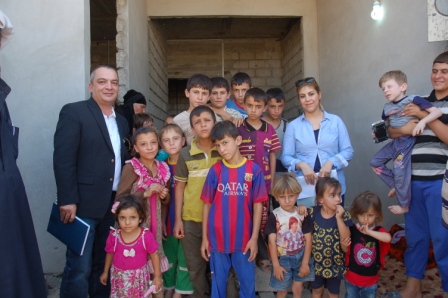
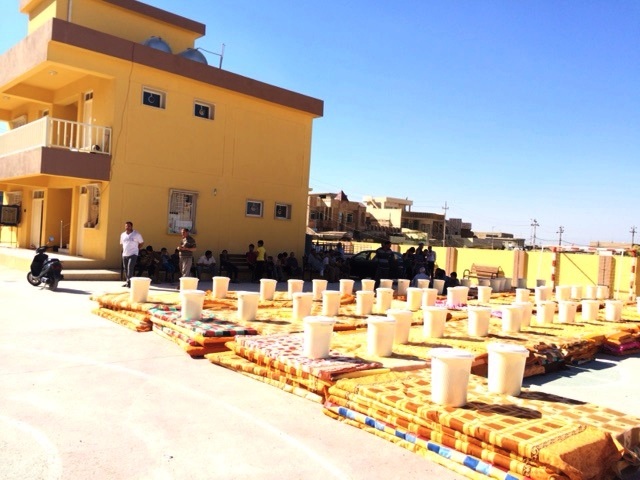
Gulf Keystone distributes food parcels to nearly 1,000 families
During the month of August, when large numbers of people fled attacks by the Islamic State (IS), Gulf Keystone Petroleum provided basic food staples and essential items to IDPs in and around its operational areas.
Food parcels were distributed to nearly 1,000 families, as well as clothing and sanitation products, covering 24 villages in Gulf Keystone’s blocks. The company’s areas of operation are in Duhok governorate, which has been the most severely affected by the IDP crisis and is hosting more than 465,000 displaced people.
So far Gulf Keystone has spent $71,000 dollars and a further $8,000, and the company’s staff have donated items as well. It hopes to continue a weekly distribution of sustenance packs and to maintain its support for the humanitarian relief effort.
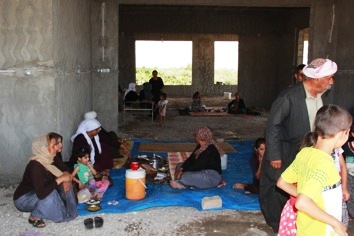
DQE International drilling company donates to IDPs in Bahirka camp
Following the attacks by ISIS, the staff of DQE International, a drilling services company, visited the Governor of Erbil to convey their readiness to help IDPs who found refuge in the Kurdistan Region. The authorities then made a request for items for Bahirka camp. Based on this request, DQE International supplied IDPs in Bahirka with 100 fire extinguishers, over 1,500 cans of milk powder, and 800 large cool boxes.
Genel Energy and TTOPCO provide aid for IDPs in Slemani and Erbil governorates
Liaising with local authorities and NGOs, Genel Energy and TTOPCO provided emergency aid to IDPs who have found shelter in Slemani and Erbil governorates after fleeing attacks by ISIS. The focus of Genel Energy’s and TTOPCO’s efforts was on helping IDPs who are sheltering near their areas of operation or in locations that have been less frequently visited by NGOs.
In Slemani governorate, Genel Energy allocated around $15,000 US dollars to its emergency aid campaign, which was carried out outside its annual CSR budget. The company delivered essential items to local IDP sites and aid centres, targeting the needs of children, women and the elderly, such as beds for those who struggle to sleep on the floor, blankets, fans, freezers, milk, diapers, and gas cylinders for makeshift kitchens.
In Koya and Taq Taq districts, 668 IDP families, mostly Yezidis and Christians, have found shelter in different sites. Of the 3,350 IDPs in those districts, 259 are children under the age of 5. Taq Taq Operating Company (TTOPCO), which is jointly owned by Genel Energy and Addax Petroleum, allocated some $25,000 US dollars for food packages. A further $5,000 dollars was spent on providing for children’s and women’s daily needs such as diapers, baby milk, baby bottles and sanitary goods. TTOPCO’s staff and CSR team, together with volunteers from Koya University, distributed the supplies as well as children’s toys to all the IDP sites in the two districts.
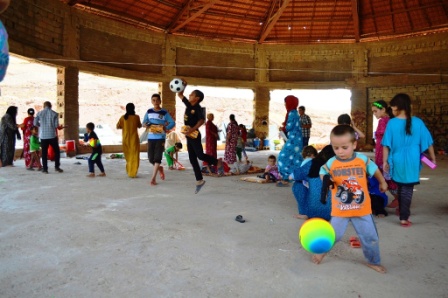
In Erbil governorate, Genel Energy coordinated with government officials and local NGOs to help displaced families who are sheltering in school buildings, churches and camps, many of whom belong to religious minorities that were attacked by ISIS. A total of 200 families were given foodstuffs, bedding items, children’s shoes and baby necessities.
The company also decided to distribute aid in Shaqlawa, because its distance from Erbil city makes it more difficult to access by NGOs. Those receiving the items in and around Shaqlawa included Yezidis, Shabaks and Kakayis in Basrma camp, and Christians who are sheltering in Shuhada church. Genel also donated aid packs to Yezidis and Kakayis who have sought refuge in the Christian Ankawa quarter and in various schools and camps in Erbil governorate. At Bahirka camp it made a delivery of aid packs via the Barzani Charitable Foundation, one of the largest humanitarian relief organisations in Kurdistan.
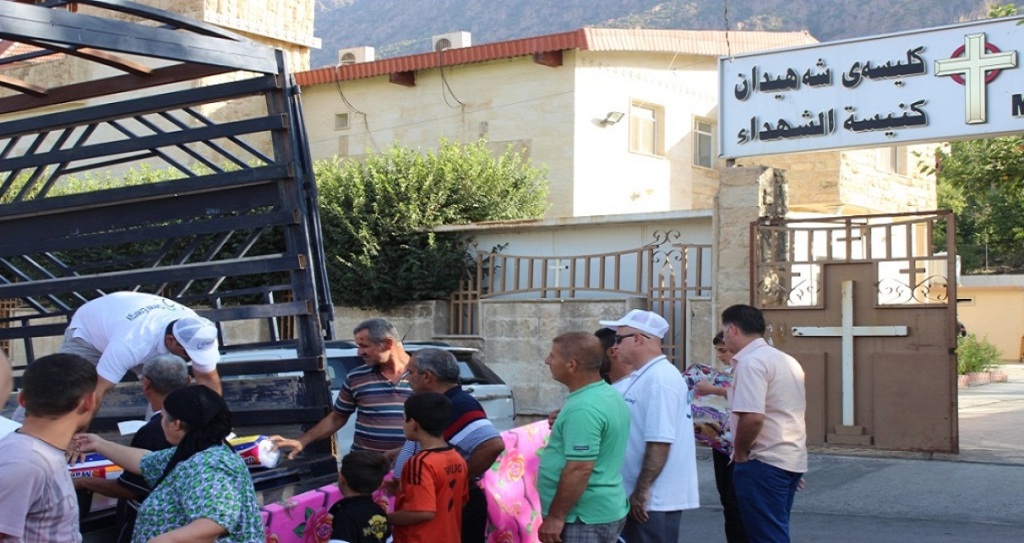
Oryx Petroleum funds mobile clinic service for IDPs and provides drinking water to communities on ISIS frontline
As an integral part of its CSR commitment, Oryx Petroleum has responded to the region’s most recent humanitarian crisis by expanding its mobile clinic service to provide additional medical care to the IDPs within Erbil. The visits are conducted by Kurdish female doctors who travel from one location to another delivering much needed treatment to vulnerable communities, such as the Christian and Kakayi minorities who fled their homes due to the most recent attacks by ISIS. Since the inception of this programme, a total of 1,006 patients have been treated by the clinic. This initiative has been very well received by the communities and the local authorities.
In addition to the medical visits, Oryx distributed 600 hygiene packs to the IDPs in Erbil, with logistical support provided by Kurdistan Save the Children.
While Oryx operations were challenged during the recent period of security instability, Oryx took the lead in responding to the relief assistance requests made by the local authorities of Makhmour and Gwer and the Ministry of Natural Resources. Between July 27th and September 9th 2014, the company provided a total of 16 tankers of drinking water each day to the communities of Makhmour and Gwer, preventing yet one more IDP crisis in the region. A total of $90,000 US dollars was spent on this water project alone.
This aid is in addition to Oryx Petroleum’s continued support for three of the Syrian refugee camps, and the continued support to the villages throughout its area of operation, which has been on the front line of the current security problems facing the region.
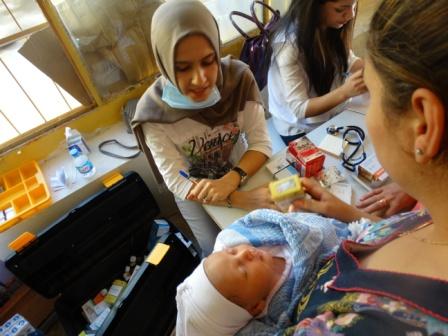
HKN provides relief assistance to Christian and Yazidi IDP families in Erbil and Duhok governorates
At the request of local community leaders and the Mayor of Chamanke subdistrict, HKN assisted many of the 500 IDP families that are sheltering in Chamanke. HKN locally purchased and directly delivered food, clothing, hygiene kits, blankets, mattresses and baking ovens. The aid was provided from 17th August to 31st October.
In addition, in August HKN helped families that were sheltering in Mazar Church in Erbil by providing portable toilets, two wash stations, and hygiene items. IDPs in Mangesh and Atrush in Duhok governorate also received food aid.
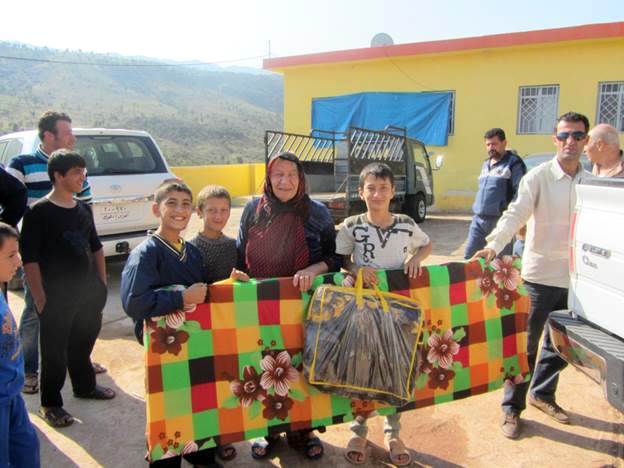
- Details
- Category: KOGHI NEWS
- Published: 20 October 2014
- Hits: 17990
